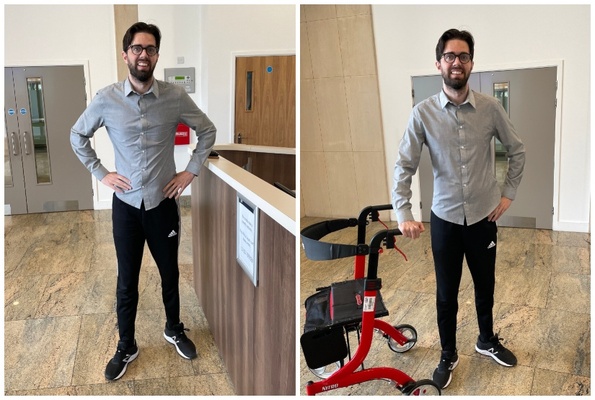22 Apr 2024by Jason Winter
Jason Winter is TTG’s campaign marketing manager. He was diagnosed with multiple sclerosis (MS) in August 2022. During MS Awareness Week (22-28 April), Jason shares his MS journey, and why he can’t wait to get back to one of his great loves – travel.
Well here we are, it’s MS Awareness Week (22-28 April). And I feel it is only right to share my own experiences of adapting to life living with the condition
Firstly, what is MS? Multiple sclerosis is a life-long neurological condition caused by your immune system mistakenly attacking the brain and nerves. Had I heard about MS? Yes. Did I know what it really was? And think it would ever impact me? Absolutely not.
Unfortunately, there is no cure for the condition at present, but medicines and treatments are available to provide some control of the condition and ease some of the numerous symptoms the condition can cause.
But this isn’t the end of my love affair with travel – professionally and personally. I’m adapting, and continue to adapt by – quite simply – giving it my all.
Working life
With MS altering my personal life, it of course means making adjustments to my working life too. I am incredibly lucky and grateful to be part of TTG Media. The team is talented, hard working and displays humility for all to see.
For me, I felt it was best to open – to have open lines of communication and to work with my colleagues to strike the best balance and seek the best solutions.
This can be as simple as not feeling under pressure to attend the office, being upfront about the many medical appointments required, and assessing what reasonable adjustments can be made.
This was particularly important in the early days of the disease, although the situation probably still feels new to everyone, with my diagnosis and treatment all coming in the past 12 to 24 months.
I am sure, or I at least hope, the team knows I will always try, persevere and do my best to remain positive. That’s not to say there aren’t hard times. You’re learning all over again, having to cope with living in a different way.
But you’re still the same person, and it is my belief you can still contribute and make a difference professionally.
Perspective
I’m sure those of us working in this industry share a love of the magnificent world in which we live, and the adventures on which we embark. We’re in the business of helping people sell dreams.
But let’s not forget it was not so long ago that the world came to standstill. Everything we’d known and loved was abruptly and painfully halted, with no clear indication of when things would open up again and what this would mean for the travel industry. Would there still be one?
This coincided with my diagnosis. The way I travel will be different now, but I still want to do it. And if that means travelling in a different way, then so be it.
In that spirit, I’ll be starting with a trip to Sicily in May with a travel company specialising in disabled-friendly and accessible holidays.
I cannot wait. I cannot wait to meet new people, see a part of the world I’ve not been to, indulge in some fine cuisine — and maybe an alcoholic tipple or two.
Gratitude
I close by acknowledging life is different for me now. How can it not be? You’re fighting this disease every minute of every day, but we find inner strength we didn’t know we had and we carry on.
In doing so, I remind myself to be grateful. Grateful for the wonderful people in my life, grateful to still have the opportunities to live my life, grateful to still participate, grateful still to be able to travel thanks to the progress this industry is making.
We’re not here to just exist, and these life changes are simply part of my life journey.
Jason Winter in TTG’s campaign marketing manager. You can find our more about MS and MS Awareness Week via the MS Society, the MS Trust and MS UK, among others.
Focus on MS
It is estimated there are more than 130,000 people in the UK diagnosed with MS. That’s one in 500, with about 130 people being diagnosed every week on average. MS is commonly diagnosed in people between the ages of 20 and 30. There are roughly three times as many women with MS as men.













